WooCommerce is the biggest name in eCommerce. It powers over 6 million online stores and counting.
If you’re planning to launch an online store anytime soon, you’ll want to consider WooCommerce. It’s the most popular eCommerce solution you can use.
But why?
What is WooCommerce? What is it used for? Why is it so popular? What’s so good about it that so many people use it? What WooCommerce features make it stand out?
In this article we will explain everything you need to know about WooCommerce.
We use our extensive experience of running successful online stores and from developing SureCart to answer all your questions.
What Is WooCommerce?
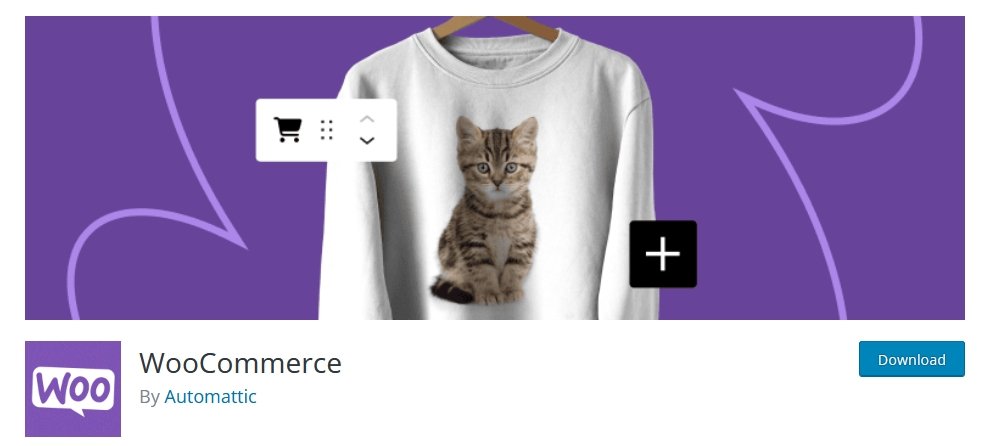
WooCommerce is a free, open-source eCommerce plugin that can turn any WordPress website into a fully functioning online store.
It adds a store structure, payment gateways, product pages, a checkout page, a new eCommerce database and an entire dashboard to help you build and manage everything.
You can run it alongside your WordPress website or turn the entire site into a store. The flexibility is there to help you create anything you like.
As WooCommerce is designed to work with WordPress many of the screens, controls and options look and feel the same.
That’s a significant advantage to anyone new to eCommerce and who doesn’t want to learn a new way of working.
If you’re new to WordPress, check out our detailed step by step guide showing you how to build an online store.
Want to elevate your WordPress eCommerce experience? Discover a hassle-free WooCommerce alternative! 👇
Why Is WooCommerce So Popular?
Here are just a few reasons why WooCommerce is such a popular way to build an online store:
- WooCommerce and WordPress are free. Free really is the best price.
- WooCommerce is open source. Anyone can use, modify, or extend the code.
- WooCommerce is beginner-friendly. You don’t need to be an expert or a developer to create a store.
- WooCommerce is flexible. Add functionality using extensions (plugins) without requiring coding skills.
- WooCommerce is responsive. It works well on all devices and screen sizes.
- WooCommerce is secure. Your store can be made very secure with simple tools.
- WooCommerce has thousands of free and premium themes and plugins. Build and customize your store however you like.
Those are just some of the reasons why WooCommerce is a great option to build a secure, flexible online store.
It’s also worth mentioning that you can accomplish a lot with WooCommerce entirely for free.
All you need to purchase is a domain name and hosting. Every other expense is purely optional.
Is WooCommerce Only for eCommerce?
Yes, WooCommerce is purely for eCommerce. You can do more with it but that will usually require paid plugins to add required features.
If you want to build an online store, WooCommerce is more than capable.
- Looking to build a membership website? Try SureMembers.
- Just want to add appointment booking to your website? Try LatePoint.
WooCommerce can be used to build stores that can sell physical products like jewelry, clothes, coffee, and digital items too if you want to.
Basically, if you want to sell anything online and accept payments, WooCommerce is a great solution.
WooCommerce Benefits
We hope you’re now beginning to see why we like WooCommerce so much.
Here are a few more real-world benefits of using WooCommerce:
1. Time Tested and Robust
WooCommerce has been around for over a decade and is continually refined and improved to keep up with developments.
The fact that Automattic, the company behind WordPress.com bought it means it isn’t going anywhere. There’s a whole team of talented developers working on WooCommerce to keep it at the top of its game.

There’s also a future roadmap that stretches long into the future and it’s as safe a bet as anything can be.
2. No Coding Required
WooCommerce has been designed for everyone. While it can be complex at times, you’ll rarely, if ever, need to touch any code.
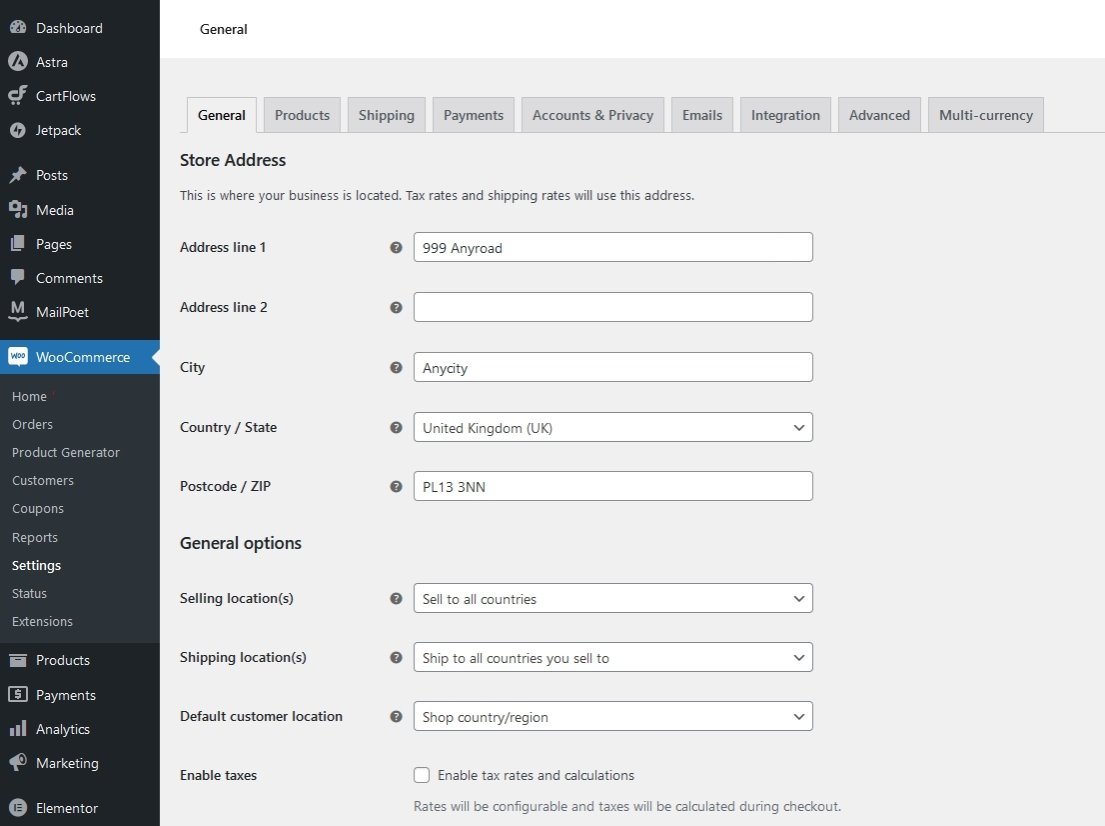
Everything can be done with menus and simple controls. If you know your way around WordPress, you’ll be able to use WooCommerce with ease.
2. Flexible eCommerce
WooCommerce is a very flexible product that can be tailored to the needs of almost any business.
- Want to sell physical products?
- Open a dropshipping store?
- Distribute digital products?
- Charge a monthly fee for accessing protected content?
WooCommerce can do all these things and more.
3. Library of Extensions
WooCommerce has a huge library of extensions you can use for any purpose.
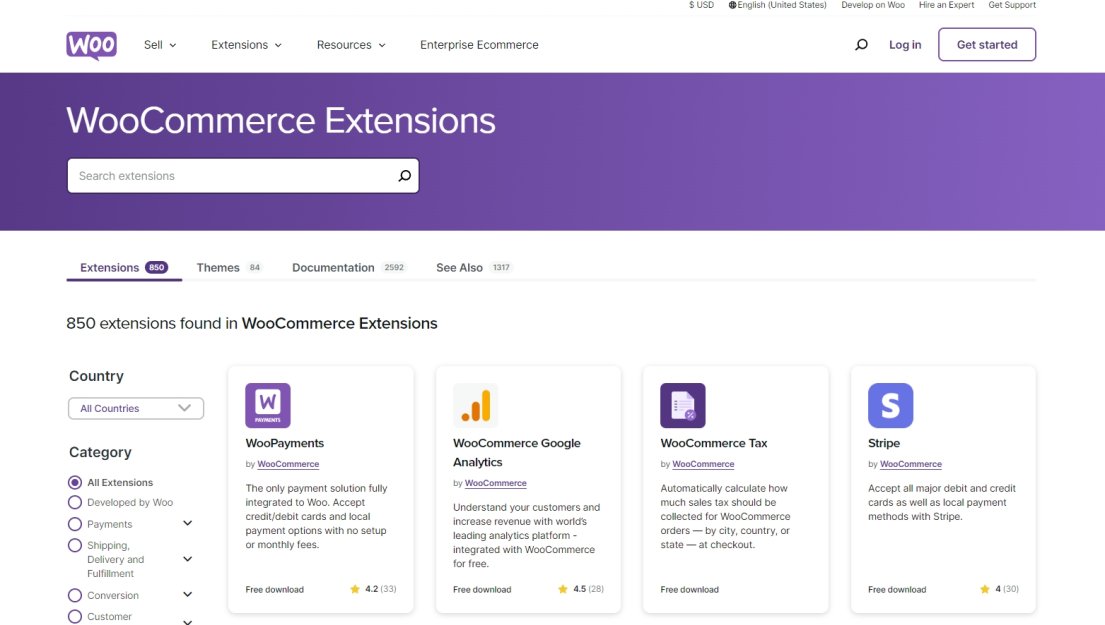
They work exactly the same as WordPress plugins. Find an extension with the features you’re looking for, install it into WooCommerce and you’re good to go.
Some extensions are free, while others will need to be paid for.
4. Integrations
With millions of installations, everyone wants to be friends with WooCommerce.
And that benefits you.
It means most relevant apps, platforms and solutions will play nicely with it or will be able to integrate with it somehow.
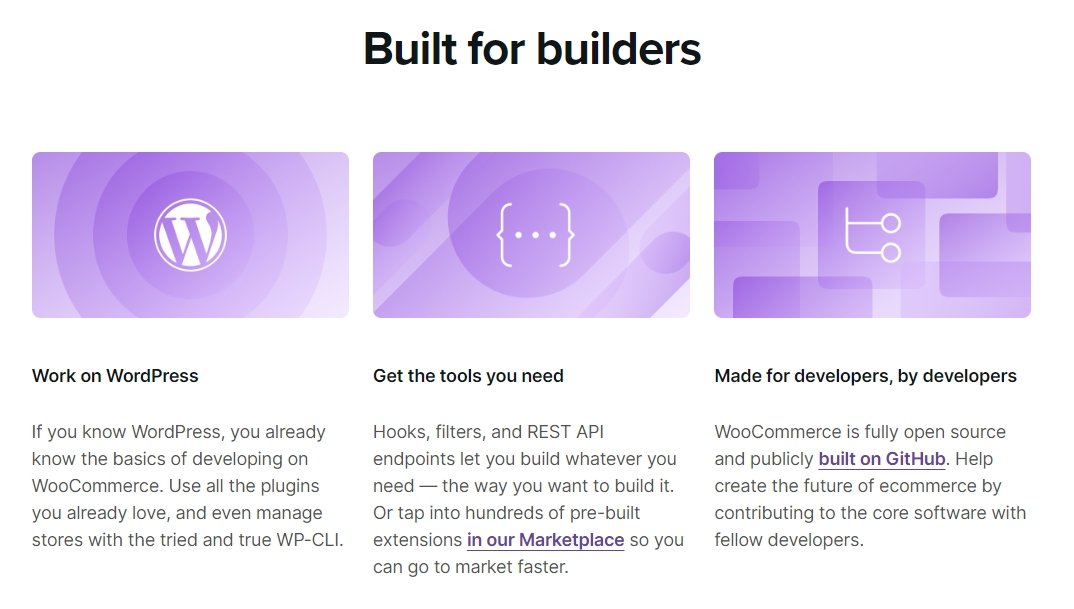
For example, linking your email marketing platform or CRM has huge productivity benefits. Good job most solutions work with WooCommerce!
Being able to connect those with WooCommerce either using extensions or OttoKit, can help your business run much more smoothly.
5. Free and Modular
Thanks to this modular approach you can gradually expand as your business grows without the need to make a large upfront investment.
You can create a 100% functional online store with WooCommerce for free. Extensions are purely optional.
Even if you don’t pay a dime you can enjoy dozens of WooCommerce features:
- Secure payments via Stripe or PayPal.
- Automatic sales tax calculation via Jetpack.
- Powerful product management.
- WooCommerce blocks for the WordPress editor.
- One-page checkouts.
- Product variations.
- Link to external or affiliate products.
- Shipping calculation costs.
All for free!
Key WooCommerce Features
Here are some WooCommerce features we like most:
Order and Inventory Management
Order and inventory management is fairly straightforward. There are a couple of ways to check stock and see the number of orders you have.
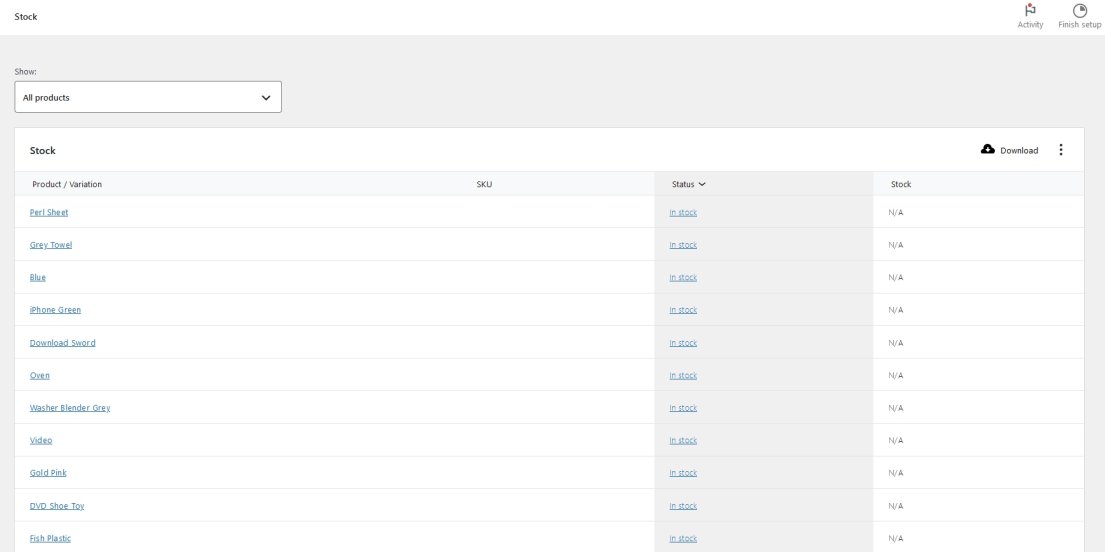
Navigate to Analytics > Stock to check items in stock.
Select Analytics > Orders to check orders for the day, month, quarter or year.
You can also access stock and order data from WooCommerce > Reports.
Whatever data you’re looking for, you’ll find it here somewhere.
Product and Catalog Management
Product management in WooCommerce isn’t the easiest, especially for larger stores, but it is comprehensive.
Select Products from the side menu and you’ll see a list of your products in date order.
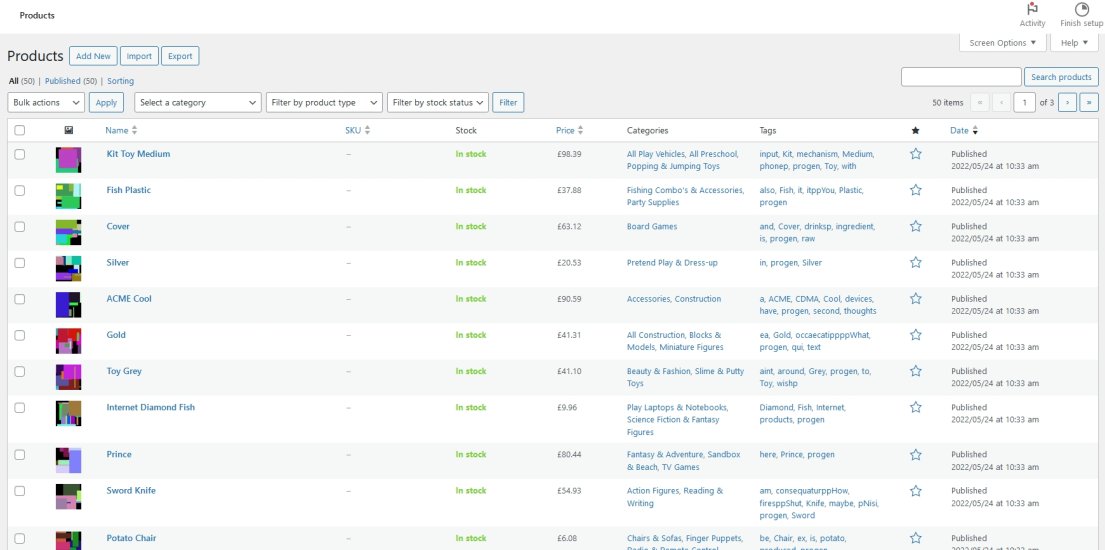
There are filters at the top of the screen so you can refine by category, product type and stock status. This can help a lot with ecommerce category page SEO.
Payments
WooCommerce supports Stripe and PayPal payments by default via WooPayments. Stripe lets you accept payments from a range of cards while PayPal is its own system.
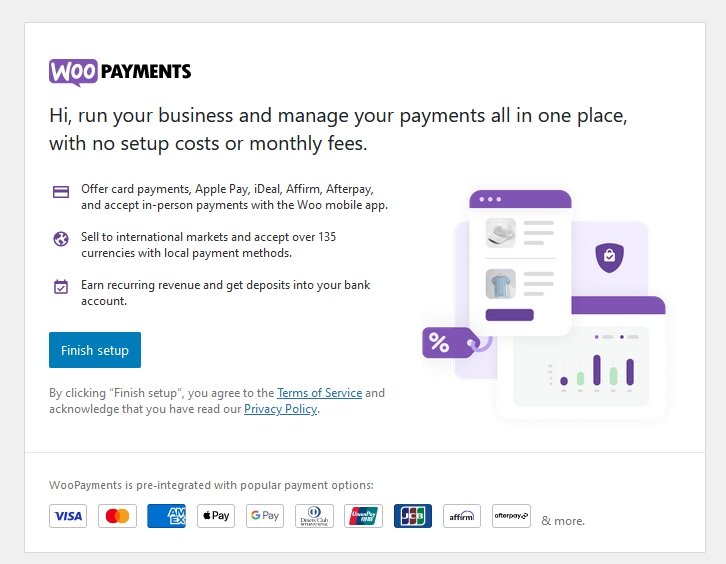
There are extensions available to accept local currencies or payment options depending where in the world you live. All will work in much the same way as Stripe.
The payment gateway handles the transaction and pays into your bank account, so there’s no security implications or extra precautions you need to take.
Checkout
The default WooCommerce checkout page is okay but hardly inspiring. It will be fine to begin with but once you’re up and running you’ll probably want to optimize it.
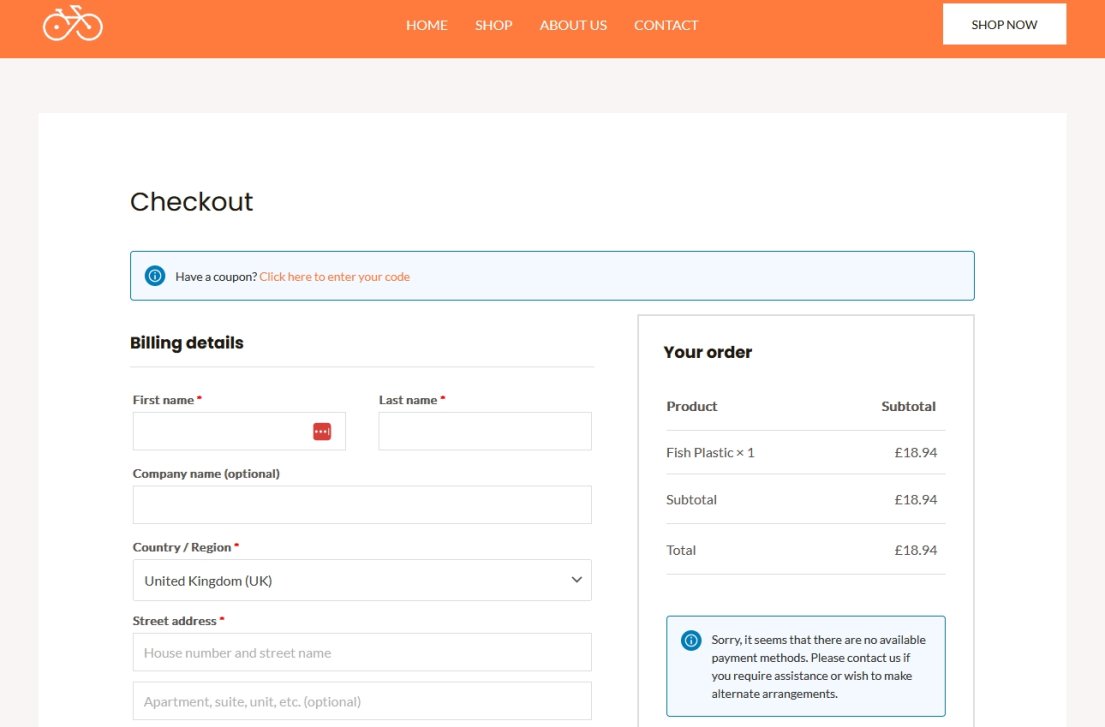
Plugins such as CartFlows offer optimized checkout templates you can import and use.
They can also add tools to help improve the customer journey, add order bumps, upsells and other tricks retailers use.
And if you want to take it even further, combining CartFlows with Modern Cart can completely upgrade your cart experience too.
Modern Cart helps create a smooth, modern, and frictionless cart that boost sales. Your customers can easily adjust quantities, apply coupons, and even add recommended products – all without leaving the cart page.
Want to see how Modern Cart uplifts your WooCommerce store? Watch this quick demo.
Shipping
WooCommerce has basic shipping handling tools but dispatch will mainly be managed separately.
You can set up shipping zones, categories and other details relatively easily to manage charging.
The physical packing and arranging collection or dispatch will all have to be managed separately though.
Analytics and Reports
WooCommerce has done a lot to improve analytics and reporting over recent years.
The Reports menu item in the WordPress dashboard can show you clearly how many sales were made, how many orders placed, value of orders and other metrics.
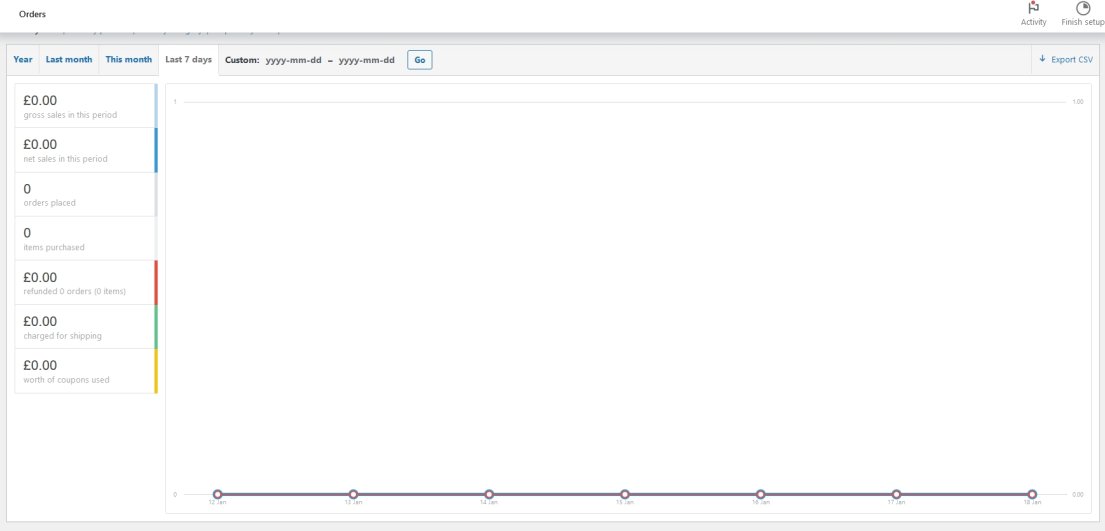
The Analytics menu item can provide basic insights into store performance including sales, orders, net sales and more.
WooCommerce also integrates with Google Analytics for insights into store performance, user origin, time on page and other details you’ll eventually want to know.
Marketing and SEO
WordPress and WooCommerce are both SEO friendly but that won’t be enough. You’ll need to use WooCommerce SEO best practices to be found in search engines.
WooCommerce does play nicely with marketing tools and paid ads to help get your name out there.
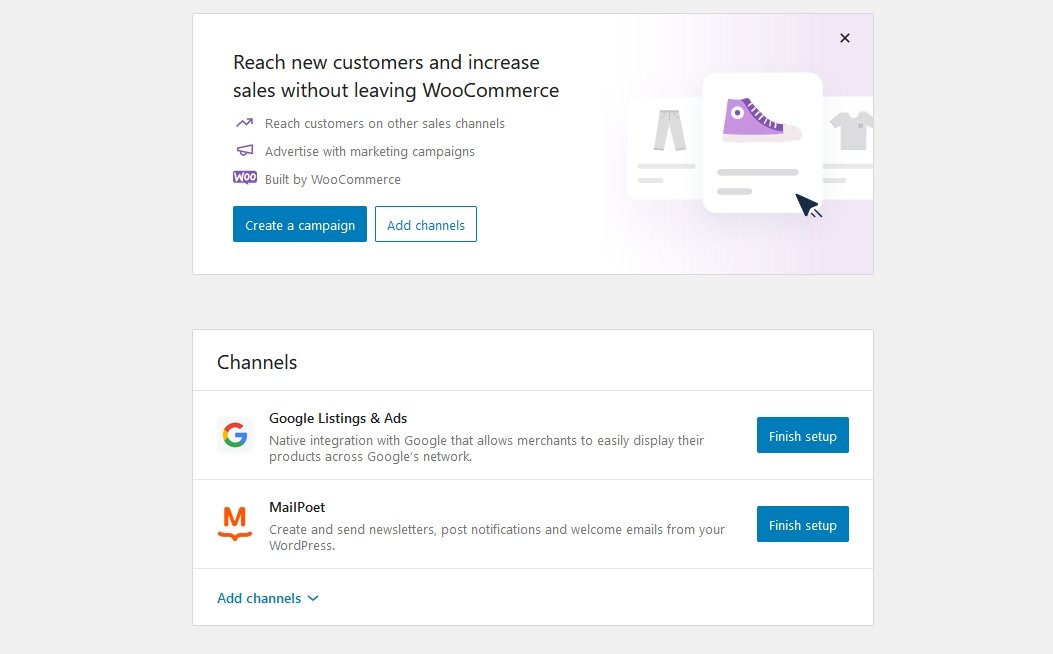
Those alone won’t be enough so you’ll need to perform as many marketing tasks as you can to complement the built-in options.
How Much Does WooCommerce Cost?
As you already know, WooCommerce is completely free, as is WordPress.
There are a couple of essential costs and some optional ones:
| Feature | Price |
|---|---|
| Hosting | $5-$15 per month (avg $10 per month) |
| Domain | $10 per year upwards |
| WordPress | Free |
| WordPress theme | Free or $50-$150 per year |
| WooCommerce | Free |
| Additional plugins | Free or $69+ per year |
| Total | From $130 per year (using free options) From $349 per year (using optional paid options) |
Learn all you need to know about the cost of WooCommerce in our detailed guide.
Getting Started With WooCommerce
As WooCommerce is a plugin for WordPress, you’ll first need to install and set up WordPress.
Here’s a complete guide on how to build a WooCommerce website with Elementor and the Astra theme.
It’s very easy to do!
Here’s a rundown of the steps involved:
1. Hosting and Domain Name
It makes sense to invest in fast WordPress hosting. It powers your store and makes it accessible to the world.
Performance is key in online shopping so choose your host carefully.
A domain name is a permanent address on the internet, for instance, https://clone.wpastra.com/.
You can buy web hosting and domain name from the same company for as little as $5-$15 per month.
We’ve collected some of the best WooCommerce hosting providers and fastest managed WordPress hosting to help you make an informed choice. To give a simplified answer, we found Hostinger WooCommerce hosting as an appropriate choice to begin with.
2. Install WordPress
After selecting a host and securing your domain name, you’ll need to install WordPress.
Most hosts make it easy using app installers. Some will even automatically install it for you.
If you want to do it yourself, download it free from the WordPress repository and follow the installation wizard.
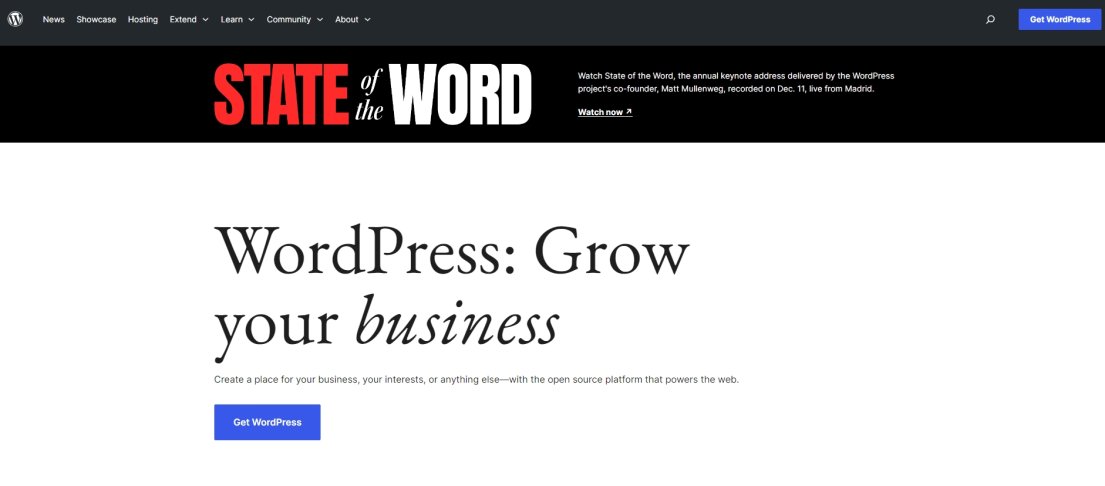
3. Install WooCommerce
Once WordPress is up and running, it takes just a couple of minutes to install WooCommerce.
Navigate to Plugins > Add New, then search for “WooCommerce“.
Click Install Now and Activate to enable it.
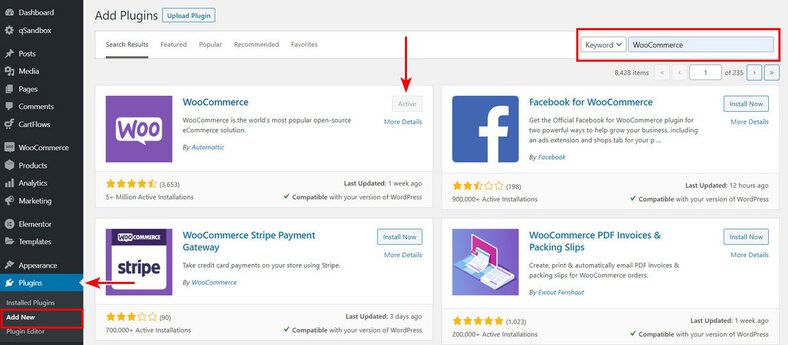
You’ll be presented with some new menu items and the WooCommerce setup wizard.
Let the wizard be your guide to help get your store up and running.
4. Install a WooCommerce Theme (Astra)
The next step is to choose the best WooCommerce theme.
We recommend our own Astra theme. It’s fast, highly customizable, and lightweight, ideal for online stores.
Astra is used on almost 2.4 million websites and has over 5,600 five-star ratings!

Astra is a free WordPress theme but there are premium plans if you want more building blocks and tools.
Check the pricing for Astra premium plans. If you want to take Astra to the max, the Astra Business Toolkit bundle to get unlimited access to SkillJet for free!
5. How To Add and Manage Products
An eCommerce store is nothing without products.
Fortunately, adding a product is easy and works in the same way as creating a post or page in WordPress.
Select Products > Add New and fill in the different fields on the page.
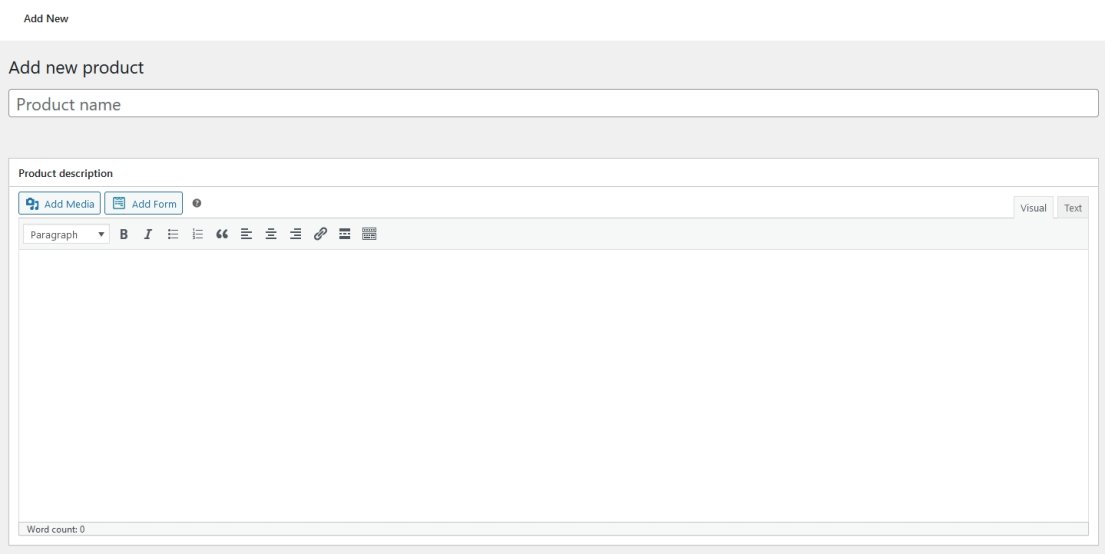
Make product pages as attractive as you can, use lots of images, positive language and write from the customer perspective.
If you want to learn more, read how to add and manage products in WooCommerce.
6. How To Import and Export Products
If you’re migrating from another eCommerce platform, you don’t need to add products individually.
This is an optional step but it could save you hours of work.
WooCommerce has a tool to import .CSV files and automate much of the work of migrating products from another source.
You’ll see Import and Export options at the top of the Products page.
Read our step-by-step guide on importing and exporting products with WooCommerce to learn more.
7. How To Set Up Payment Gateways in WooCommerce
Properly adding and managing products is essential, but getting paid for them is even more important!
WooCommerce has many payment gateways. Some are not included by default but you can enable them through extensions.
The setup wizard will walk you through adding Stripe, but you can add others later if you like.
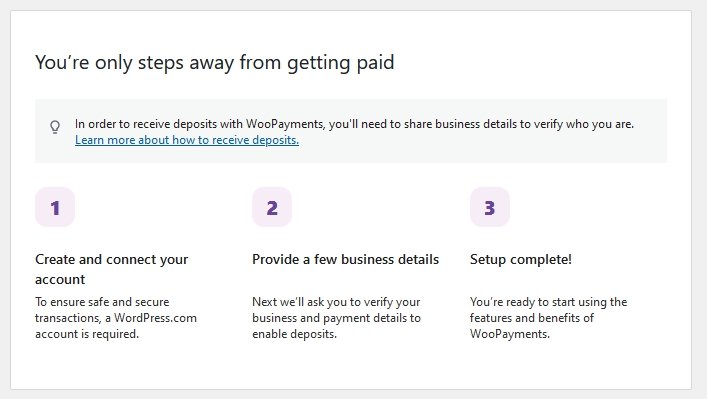
Navigate to WooCommerce > Settings > Payments to check your options.
We have an in-depth guide that explains the best WooCommerce payment gateways.
8. How To Manage Your Checkout Page
The WooCommerce checkout page is where the magic happens.
The overall design of your WooCommerce store is important, but it takes on special relevance at checkout.
The default option is not the most attractive or the one that offers the highest conversion.
That’s why it is important to learn how to customize this WooCommerce checkout page to improve conversions.
You can customize it yourself using the WordPress editor or your favorite page builder or use a third-party tool to do it for you.
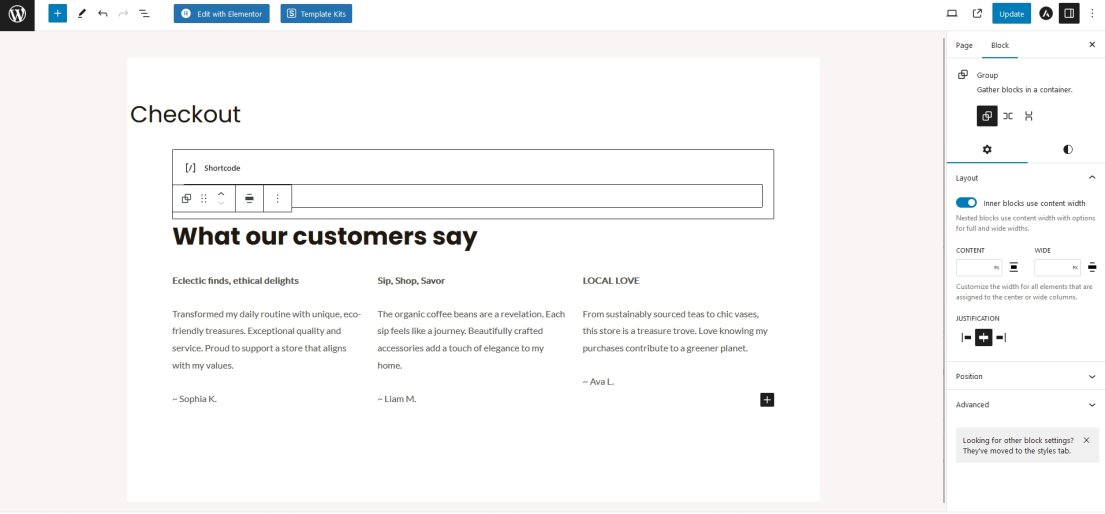
Make it as frictionless as possible, include upsells and never forget to include order bumps wherever relevant.
Even with the best checkout design, you’ll also need a strategy to reduce abandoned carts.
WooCommerce Website Examples
The Mumma Secret

Wine Warrior

Banno’s bees and honey

Simply Chocolate

R.E.D.D.

Conclusion
At this point, you should have a clear idea of what WooCommerce is, what it does and whether it’s for you or not.
It’s a great option if you want to build a flexible and reliable eCommerce store. It is fast, powerful and most WooCommerce features are free.
You can also extend its power with premium or third-party plugins.
We recommend using the Astra theme and the CartFlows plugin to supercharge your store.
Astra helps you create a more beautiful store and conversion-optimized checkout pages. CartFlows helps you drive sales and minimize losses through checkout optimization, abandoned cart recovery and other techniques.
If you’re not sure WooCommerce delivers what you’re looking for, check out SureCart. It’s even more powerful and easy to use!
WooCommerce FAQs
We hope we answered most of your questions, but just in case…
What is WooCommerce used for?
WooCommerce is used for eCommerce stores. It integrates into WordPress and can turn any website into a fully operational online store. It’s flexible enough to be able to cater to any type of store and any type of audience.
How does WooCommerce work?
WooCommerce works by using the WordPress content management system and adding the store on top. It’s both simple and complex but is easy to use and works amazingly well. It creates its own database, adds a checkout, product pages and all the elements an online store needs.
What is the difference between WordPress and WooCommerce?
There are many differences between WordPress and WooCommerce, the main one is they are used for different purposes. WordPress is a content management system designed for blogs and websites. WooCommerce is an eCommerce platform that relies on WordPress to support online stores.
Does WooCommerce require coding?
No, WooCommerce does not require coding. You can add or change code if you like as it’s open source but there is no need to touch code if you don’t want to. There are extensions and dashboard controls for everything and it’s all very easy to use.
Is WooCommerce good for SEO?
Yes, WooCommerce is good for SEO. It’s an organized system that uses best practices wherever possible to help in search. It’s no replacement for an SEO plugin or hiring an SEO expert though!
What is the advantage of WooCommerce?
WooCommerce has many advantages over other eCommerce platforms. Most importantly is that it integrates seamlessly with WordPress. It’s also completely free, open source, easy to use, flexible and provides a solid foundation for even the largest online stores.
Do I need hosting for WooCommerce?
Yes, you do need hosting for WooCommerce. It’s a self-hosted solution the same as WordPress. You’ll need hosting for WordPress so you can integrate WooCommerce into it. You don’t need special hosting or anything extra though.
What are the pros and cons of WooCommerce?
The pros of WooCommerce include being free to use, open source, easy to set up, secure, well-documented and very flexible. The cons of WooCommerce include the fact it’s limited in some areas, extensions can be expensive and it relies on your web host for performance. On balance, there are more pros than cons, which is why we like it so much!

Sujay Pawar is the co-founder and CEO of Brainstorm Force. He brings a one-of-a-kind fusion of tech brilliance, business savvy and marketing mojo to the table. Sujay has consistently spearheaded the development of innovative products like Astra, CartFlows, ZipWP and many others that have become market leaders in their respective niches.
Disclosure: This blog may contain affiliate links. If you make a purchase through one of these links, we may receive a small commission. Read disclosure. Rest assured that we only recommend products that we have personally used and believe will add value to our readers. Thanks for your support!
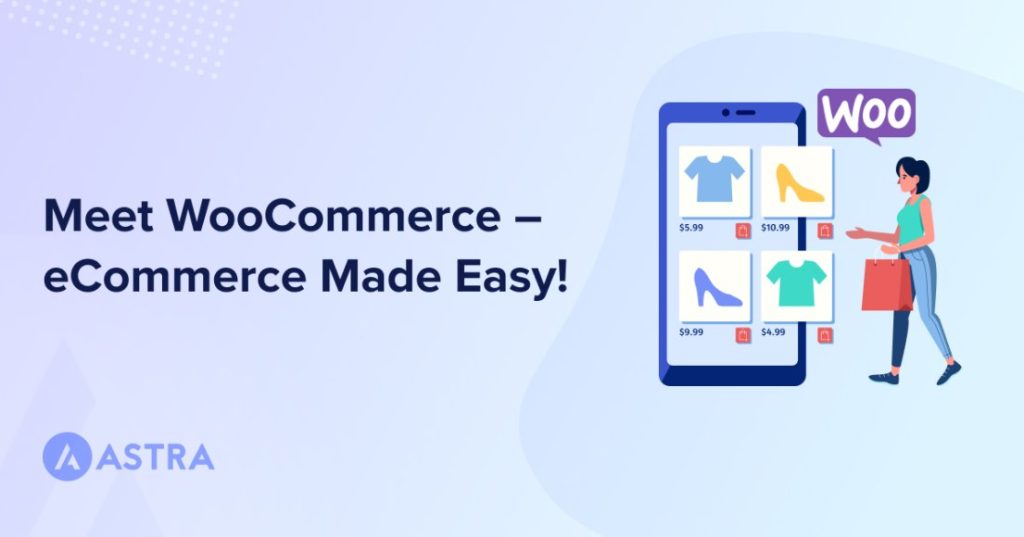


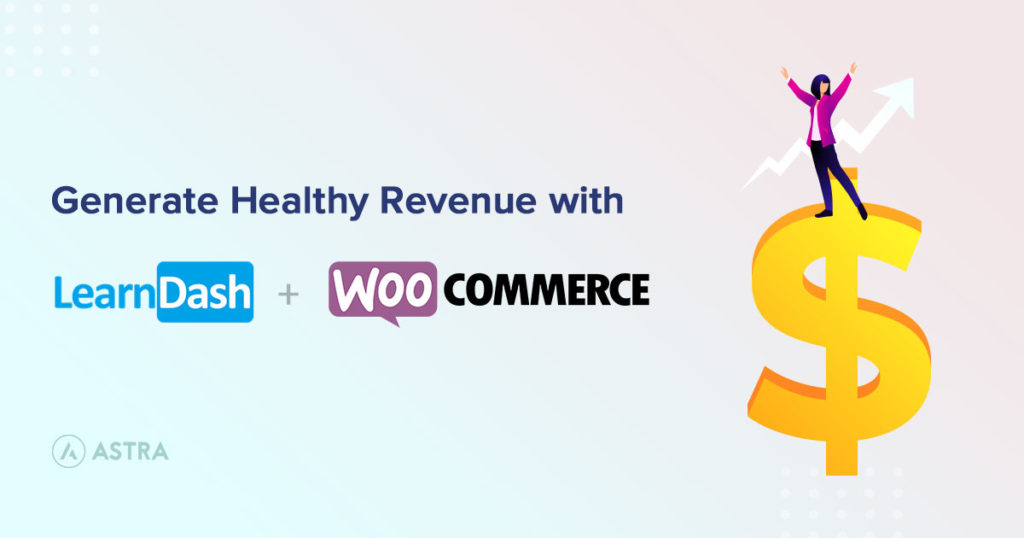

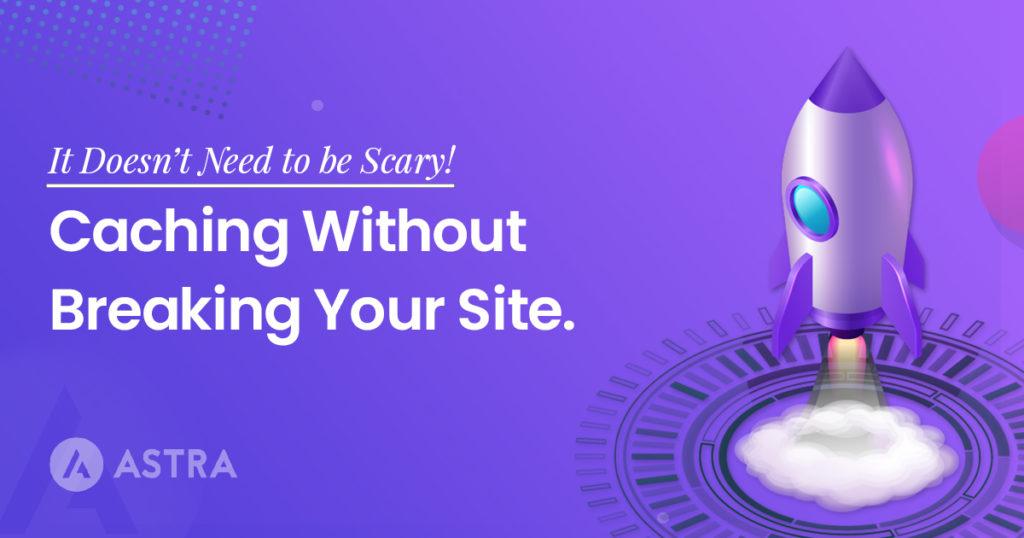
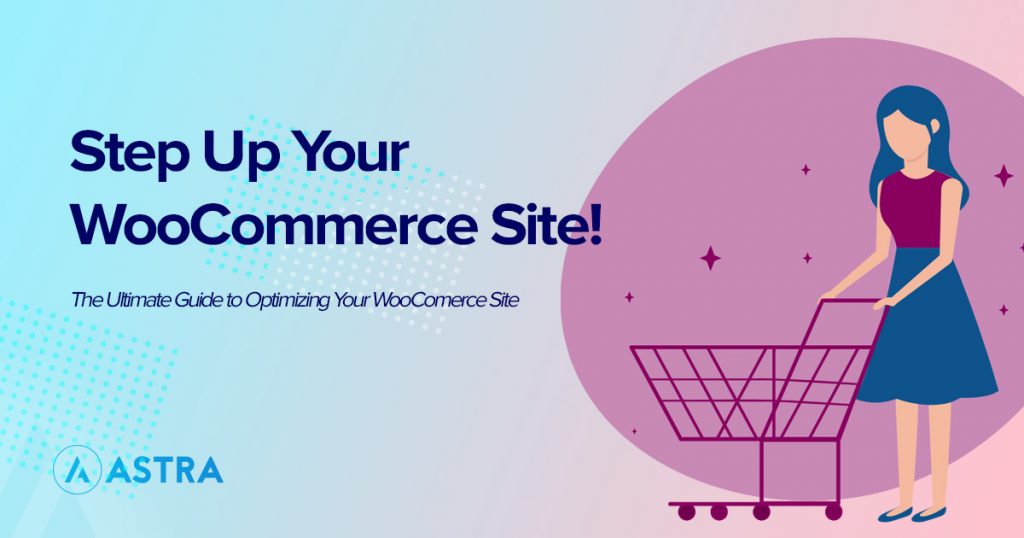
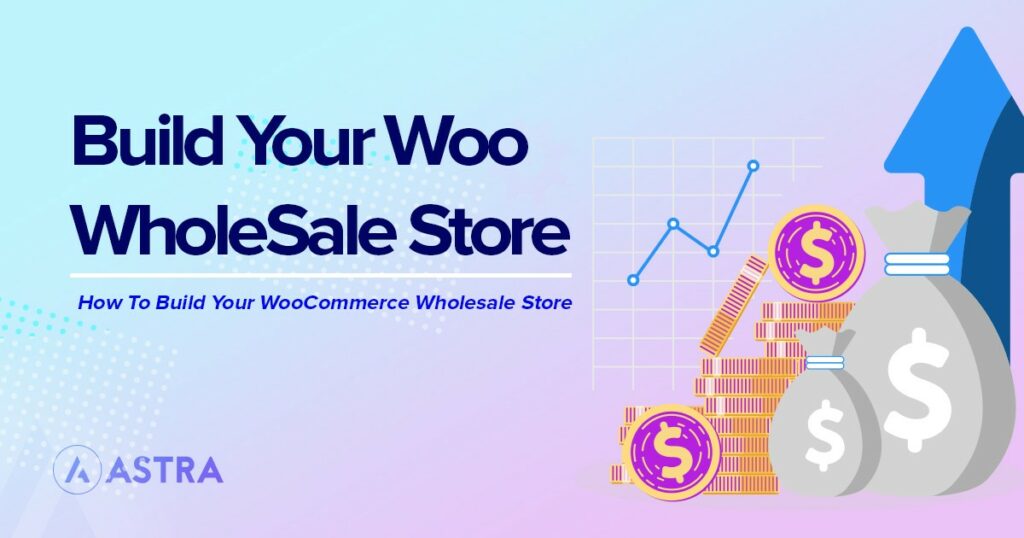
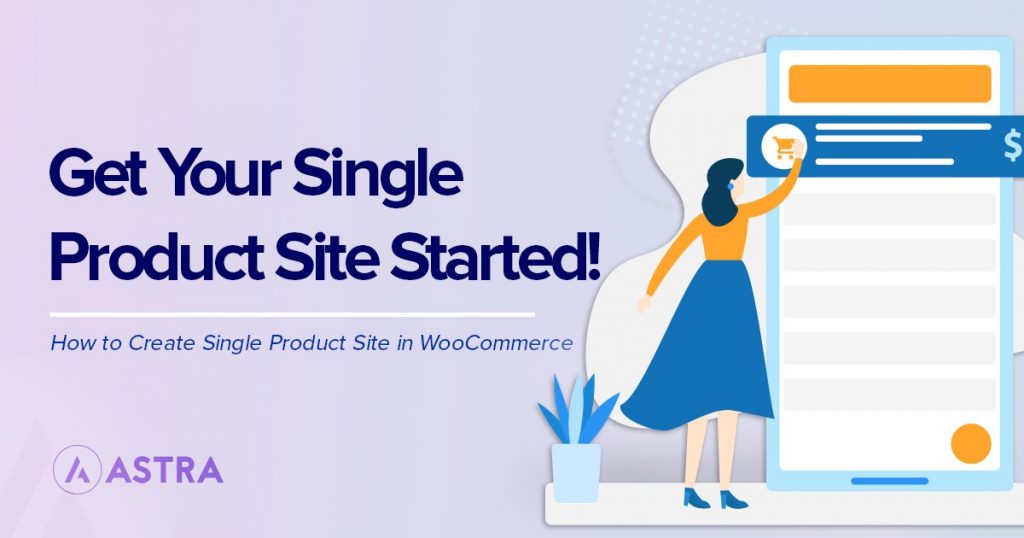

Even thought I’m working on WordPress from last 3 years, It still amaze me to how deeply we can customize WordPress and best of all it’s free.
WooCommerce is amazing and easy to use. Even thought it’s free, it has some amazing functionalities.
Nice to know more about WooCommerce and It was so helpful.
WooCommerce is amazing platform for building eCommerce websites and this numbers definitely prove that.
Astra with Elementor look’s amazing and you don’t even have to customize further. Most of my clients love it in first sight.
This article was very beginner friendly and very well researched. Thanks for sharing with us.
This is a great start, and perfect for newbie like me. I though creating eCommerce website will be hard and had a limited budget. So decided to give myself a try and results are amazing.
Having some problems but I think those can be solved.
Hello Houston,
Glad you found the article useful! 🙂
very nice blog. got to know about woocommerce. Thanks for sharing
Hello Ashwini,
Glad you found the article useful! 🙂
Before reading your article, I was illiterate about WooCommerce. I found this guide while searching for a solution for my business. This is an excellent piece of content for a beginner like me.
Hello Bobby,
So glad to hear that you found the article helpful. We appreciate your thoughts! 🙂
I loved how you guys explained the features of WooCommerce, and I wonder these features are coming from a free plugin.
I want to change my woo store’s appearance and my host provider; how can I switch the website’s theme and host provider without losing current settings, products, and user accounts? That would be helpful.
Very informative article, This clear my mind about WooCommerce.
Definitely give this article time and read it. WooCommerce can do some amazing things, and It’s free.
Good list. I would suggest using WooCommerce’s own plugins as they are most compatible and up to date.
Definitely give this article time and read it. WooCommerce can do some amazing things, and It’s free
WooCommerce and Astra is the best combo and fasts with optimizations. I would suggest pairing Astra with WooCommerce.
I heard that SSL certificates are compulsory for e-commerce websites. Is it true? And If yes, Is there any cheap host provider that comes with an inbuilt SSL certificate?
Hello Olive, they provide an extra layer of protection for your data on the WooCommerce store. Most of the hosting providers provide free SSL certificate.
Is it possible to set-up WooCommerce as an Affiliate store using affiliate products from Clickbank, eBay, Amazon etc…?
Thanks look forward to receiving your reply!
Cheers Trevor
Thank you, this is the article I was looking for. Btw may I know what you use for your great and fast website? I’m also planning to create a simple website for my business, but I need a domain and hosting recommendation. I hear asphostportal has a good reputation for that. Can you recommend them or are there any alternatives?